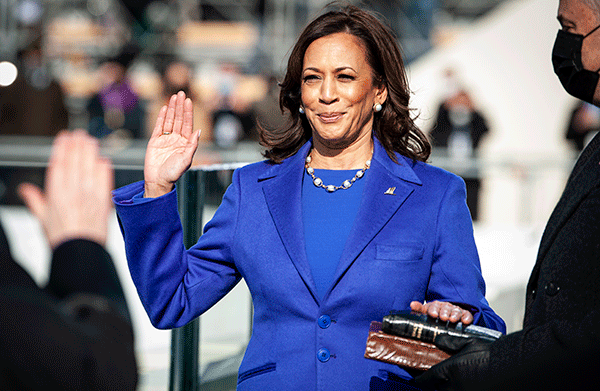When 22-year-old poet Amanda Gorman took to the stage at the Biden inauguration and so eloquently performed The Hill We Climb just after Kamala Harris was sworn in as the first female and first black and South Asian American Vice President of the US, history was made.
This wasn’t just a token show of diversity; this was a watershed moment, according to Professor Jennie Stephens, a social justice advocate, energy expert and sustainability scientist based in the US.
“There have been some positive developments in the past month or two; a colleague of mine, a black woman, just got appointed as the Department of Energy’s first ever deputy director of energy justice, too,” says Stephens, who goes on to explain why having fairer representation, rather than a patriarchy of mainly white, middle class men, is key to creating a more equitable society.
“It’s not simply that it’s not good to have homogenous people in charge making decisions for the rest of us, but it’s also acknowledging that different decisions get made when there’s more diversity,” explains Stephens, who is director of the School of Public Policy & Urban Affairs at Northeastern University in Boston.
“When women, people of colour, and indigenous folks are given opportunities to be in decision-making roles that they haven’t been given historically, we know that people bring very different priorities, life experiences, principles and even different perceptions to risk.
A US study of gender, race and perceived risk found that white men on average see everything as less risky than non-white men or women who are white or non-white, for everything from climate to smoking to AIDS to having a car crash.

“So having diversity in decision-making ensures that we can better balance these different risks,” adds Stephens, whose recent book is called Diversifying Power: Why we need antiracist, feminist leadership on climate and energy.
In New Zealand, Prime Minister Jacinda Ardern has been noticed for her empathy, particularly during the initial pandemic outbreak. “Even with coronavirus, Ardern demonstrated very strict evidence-based measures and then communicated clearly to everybody with compassion about why it was so important to follow these measures, for yourself, your community but also for the country. That’s a different kind of leadership and can result in very different outcomes,” says Stephens.
In New Zealand, albeit a small country with a population of only 4.8 million, 26 people have died from Covid-19 compared to more than 135,000 in the UK and 510,000 in the US.
But Stephens doesn’t imply women should be in charge of everything. Her book begins with the words “the climate crisis is a crisis in leadership”.
A new mix of people in power will be crucial to making effective policies and, she suggests, perhaps Covid-19 offers a chance to re-evaluate this. “We’re living through such a disruptive time right now – for big societal change to happen, you need to have this big landscape-level disruption while innovative people and organisations present alternatives.
“It’s so important to leverage this moment we’re in and we all have to have agency in that. What happens next really matters,” says Stephens, whose call for antiracist feminist leadership isn’t just about elected officials and CEOs: she believes that we all play a role as leaders in our families, our communities, or the organisations we work with.
As a feminist leader in her own field, what is Stephens’ own vision for a more sustainable society?
Firstly, from housing to transport to renewable energy to food production, she wants a focus on “eco-equity rather than eco-apartheid”.
It’s not about being able to afford the latest Tesla, she says, which can disempower many people and result in ‘climate isolationism’. Instead, sustainable climate solutions should be accessible to everyone, powered by visionary leadership, green jobs and energy democracy.
“Everywhere has access to wind and solar, with differences of course. Coastal communities have offshore wind or wave and tidal energy, inland places have geothermal. So we can actually have a locally-based heterogenous mix of different energy sources that keeps the benefits local,” suggests Stephens, who would like to see investment in large-scale solar farms and offshore wind alongside small-scale, community-owned and household level renewables.
And she wants a similar shift aware from an extractive system in food, too. Organic farming has been compared by one Princetown university professor to renewable energy, as Stephens explains: “People can grow food almost everywhere in the world. By focusing on what’s regional, there’s an opportunity to reinvest in a locally-appropriate mix of different foods that reduces our reliance on global, more corporate-based food production.”

Back to the US presidency and Stephens is aware that Biden and Harris’ current policies aren’t perfect, despite a big push on climate.
She’s particularly concerned about the focus on investing in tech such as solar geoengineering, the controversial deployment of tiny aerosol particles into the stratosphere to reflect sunlight back into space to cool the earth.
“This has all sorts of negative social justice implications and will increase the concentration of wealth and power. Technological innovation is important but by focusing solely on that, we’ve been missing all of these opportunities for social change that have to be prioritised,” she adds. “Not all climate policy is good policy – we still need a paradigm shift in how people are thinking.”
8 March is International Women’s Day, a global day of celebration that marks a call to action for accelerating women’s equality.










0 Comments